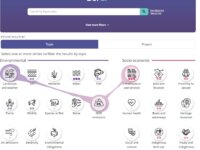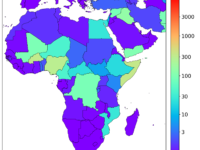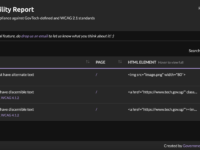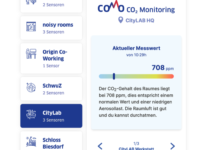Better Insights into Collective Climate Actions: The currently fragmented, insufficient and incompatible sources building the climate data framework remain a critical threat to a successful outcome of the 2023 Global Stocktake for the Paris Agreement. While we observe an increasing amount of participation, effective ways of connecting, visualizing and analysing actors patterns & impact, within the overall climate initiatives, remain limited.
Innovation Tag: Open Source
Governments are buried in hard-to-search PDF documents that hold data with great value for citizens, scientists, and public servants. At the Canada Energy Regulator, we developed data science methods to liberate 20 years – and tens of thousands of kilometres – of environmental and socio-economic data from over 1900 PDF documents from oil and gas pipeline applications. We made it easy to search and explore this data in our powerful and user-friendly search tool, BERDI.
The Transparency+ Portal is a digital platform of the Portuguese state, where citizens can access easy-to-read and updated information on public spending in an accessible way, combining data science and storytelling. Launched in 2021, the platform is now a reference resource for monitoring European funds, State and local budgets, and public contracts. In a world often perceived through lens of mis/disinformation, Transparency+ is building trust by nurturing civic engagement and open government.
The Violence Early-Warning System (ViEWS) is a publicly available data-driven forecasting system at the frontier of research that generates monthly predictions of conflict fatalities up to 36 months ahead – throughout Africa and the Middle East. The project launched in 2017 to help policy-makers and practitioners plan anticipatory action and humanitarian interventions with a transparent and evidence-based approach. It is based at Uppsala University and Peace Research Institute Oslo.
With the Quality Tools an organisation can evaluate, monitor and compare the quality and use of its services within and between organisations. The tools include a Self-assessment, Customer Feedback and Utilisation Rate Measurement tool and are free of charge. The tools were developed primarily for public sector organisations to help them develop customer-oriented digital services and improve knowledge-based management. On a national level the tools provide data on the state of digitalisation.
Case Study
Personalized feedback service for national qualification test result – Digital Mentor Service…

"Why did I fail? How should I develop my career?" To address such concerns, we developed the Digital Mentor Service of National Qualification. It leverages massive data on national qualification tests to identify each individual's weaknesses and why they fail. It also provides personalized information by matching examination history with jobs and training offered by government agencies. Supporting test takers from skills assessment and development to job placement.
BORA (acronym for "Online Relationship Database for Evaluators", in Brazilian Portuguese) is an innovative online application developed by ENAP that connects research professionals and policy managers around the country. The app makes it possible to link the needs of Brazilian public administration for high-quality policy analysis and the research of well-targeted projects by specialists based on a quick, transparent and free solution.
In an increasingly digital world, Participa.gov represents our vision for civic participation in political decision-making processes. Participa.gov is the Portuguese Public Administration's centralized, cross-cutting platform for facilitating participatory processes at all levels of government. It employs cutting-edge technology to ensure that citizens can actively participate in policy decision-making via secure and transparent mechanisms that foster trust.
Purple A11y is a customisable, automated web accessibility testing tool that allows software development teams to find and fix accessibility problems, to ensure all users have access to inclusive digital services, especially the elderly and persons with disabilities (PWDs). It is an open-sourced solution to automate periodic tasks and the testing of government digital services.
In COMo, the CO2 concentration (CO2 = Carbon Dioxide) serves as a measure for indoor air quality and aerosol pollution; the latter correlates with the potential (COVID) viral load. Objective CO2 readings via networked sensors enable operators to control the indoor air quality and thus reduce the risk of infection for visitors. Published data allow visitors to make decisions about visiting the facility.
All content is available under open source licenses (MIT, BSD, Creative Commons).




